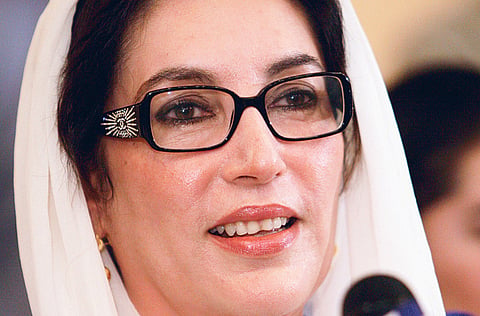Full inquest is essential
Gilani has agreed to set up a committee tasked with answering one question about Bhutto's death, but this is insufficient

In a surprise development, Pakistan Prime Minister Yousuf Raza Gilani has set up a three-member fact-finding committee to investigate only one aspect of the complex and tragic assassination of former prime minister Benazir Bhutto. This decision is disappointing because it falls short of the demands and expectations of Pakistanis after the release of the UN commission of inquiry's report on April 15.
The decision to set up this committee is a result of Friday's meeting between Gilani and Army chief General Pervez Kiyani. It was Kiyani who requested the prime minister mandate the committee to determine "whether the then director-general of Military Intelligence gave an order to police officials to wash or clean the crime scene after the murder". According to paragraph 133 of the UN report, unnamed sources told the commission members that City Police Officer Saud Aziz did not independently decide to hose down the scene of the crime, but was ordered to do so by then Military Intelligence Chief Major General Nadeem Ijaz Ahmad.
Ijaz, who is related to former military ruler Pervez Musharraf's wife, is a controversial figure. At present he serves in Gujranwala as a logistics area commander. He has been singled out as being involved in the decision-making that led to many major blunders during Musharraf's reign, including the killing of Baloch rebel leader Sardar Akbar Bugti and the removal of Chief Justice Iftikhar Chaudhary.
The army chief has stepped in and requested that this committee be set up and present its report within seven working days to try and prevent the armed forces' name being sullied. The committee is expected to settle the question of the general's involvement in the alleged destruction of evidence.
Under suspicion
However the UN report implicates, directly or indirectly, the establishment and the intelligence agencies in Bhutto's assassination, and subsequently in hindering, stalling and prejudicing the investigation. The names of two other Inter-Services Intelligence officials have also figured in the commission's report. Their role is yet to be determined.
Questions about the army are being raised in the media. While other serving bureaucrats and police officers who were named in the report were removed from their posts, no action was taken against Ijaz.
Whether this committee can answer the very crucial question of whether Ijaz was involved without raising additional questions in the process is unclear.
What is clear is that while the man who leads the army is keen to put speculation to rest, accusations and conspiracy theories about the armed forces, the government and the ruling party will hardly expedite the investigation process.
The position of the Pakistan Peoples Party's (PPP) leadership is that the case, currently being heard in the Rawalpindi Anti-Terrorist Court and investigated by the Federal Investigation Agency's Joint Investigation Team since July 2009, will continue.
A section of the PPP leadership is demanding that the government set up a fresh criminal inquiry committee.
Numerous compelling questions have arisen since the release of the UN's report. Why was sufficient security not provided by the federal and provincial authorities? Why was the PPP's own security so lax? Why did two key men, Rahman Malek and Babaer Awan, now ministers, drive away in Bhutto's back-up car? Why did Musharraf insist that a press conference be held within 24 hours to release a statement saying that Bhutto's death was caused by one of the levers inside the car?
These are questions that must be answered. The PPP government must set up a high-powered, time-bound criminal investigation to determine who planned and executed the attack on Bhutto.
Refusal to set up a new committee would likely result in the Supreme Court taking suo motto action. Only a new investigation can, through the process of elimination, clear the names of the PPP leadership and help place the blame where it belongs.
Nasim Zehra is a writer on security issues. She is currently a fellow at the Harvard University Centre for Asian Studies.



